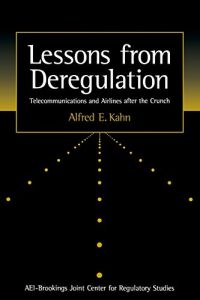Join getAbstract to access the summary!

Join getAbstract to access the summary!
Alfred E. Kahn
Lessons from Deregulation
Telecommunications and Airlines after the Crunch
Brookings Institution Press, 2004
What's inside?
Deregulation is not to blame for recent woes in the airline and telecommunications industries — but regulation might be.
Recommendation
You would hardly expect economist Alfred E. Kahn, the grandfather of deregulation, to back down on the concept now - and he doesn't. This helpful, up-to-date guide gives a snapshot of Kahn's take on the state of aviation and telecommunications deregulation amid the economic struggles of the post-bubble, post-Sept. 11 era. Does deregulation still serve the public's interest? Kahn, whom you can thank or curse the next time you board a cheap, overcrowded flight, argues staunchly that deregulation's biggest problems come from regulatory authorities who succumb to the temptation to, well, regulate. This is particularly true in the arcane field of telecommunications policy, where some governmental bodies have passed regulations designed to stimulate artificial, rather than market-driven, competition. Overall, the book is stronger when Kahn analyzes the complexities of aviation deregulation than it is when he unravels telecommunications policy. getAbstract highly recommends it to policy wonks who love what Kahn hath wrought and to those who wish they could hang up on it.
Summary
About the Author
Alfred E. Kahn is considered the leading authority on public utility deregulation in the United States. A former economic adviser to President Carter, he chaired the New York Public Service Commission. He is currently a professor emeritus at Cornell University.




















Comment on this summary